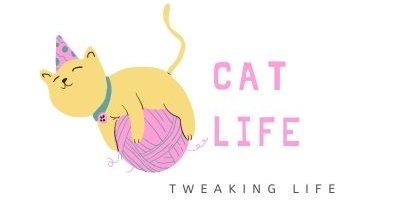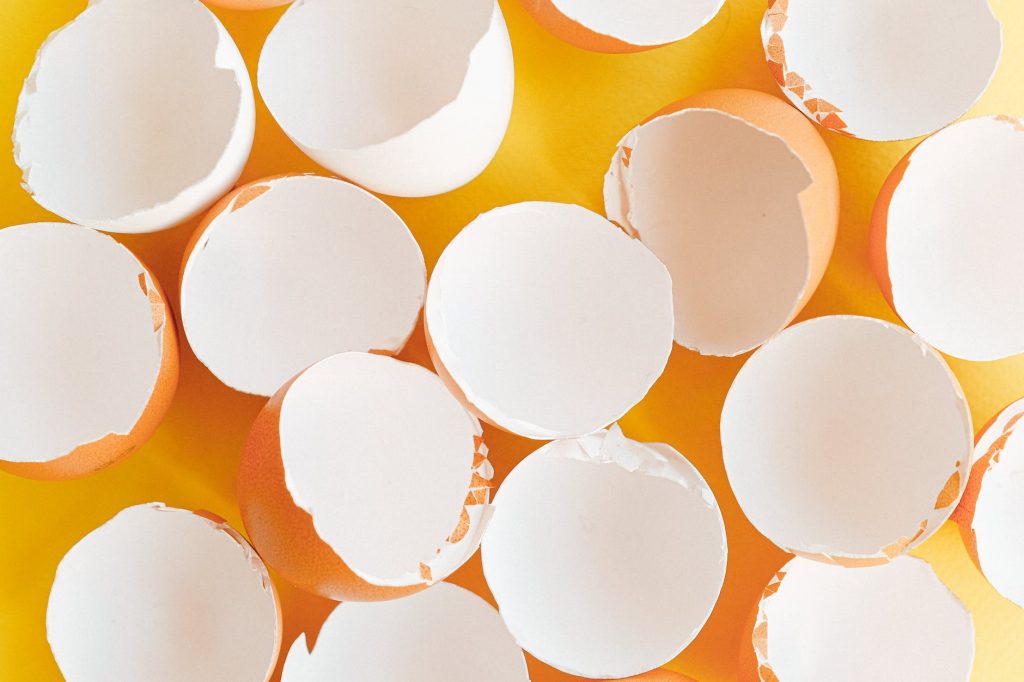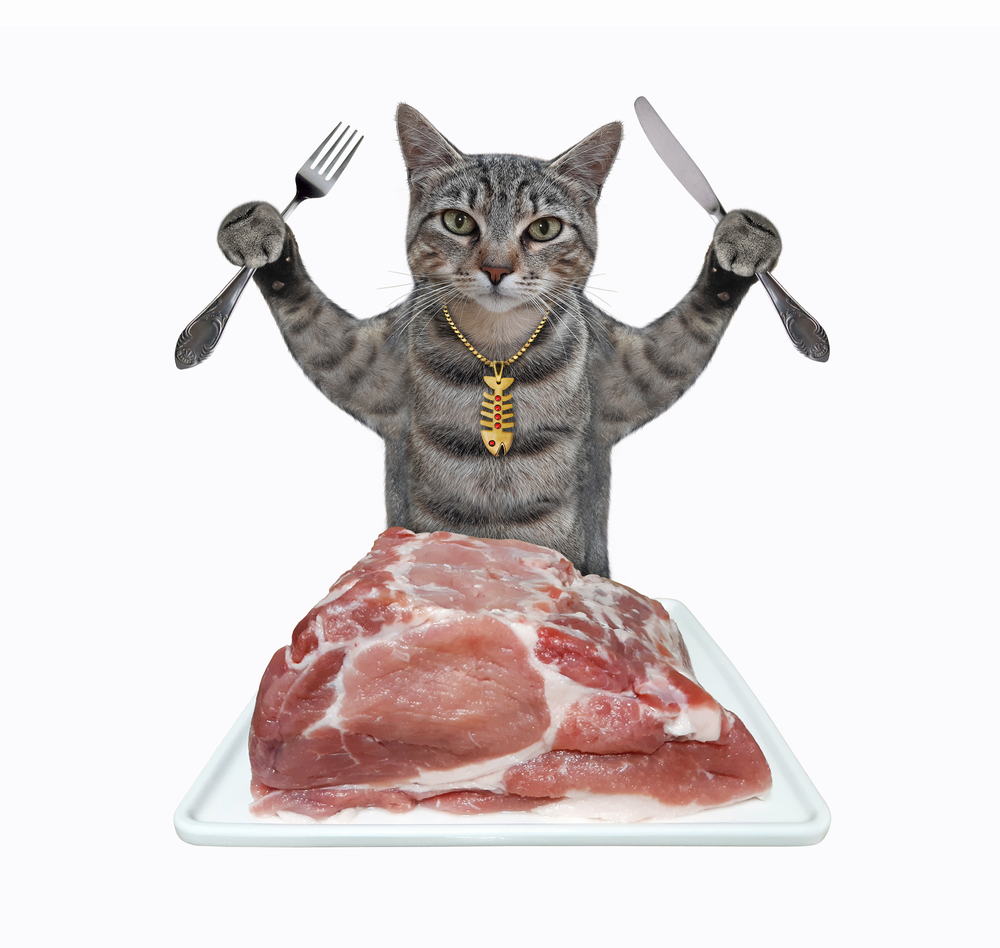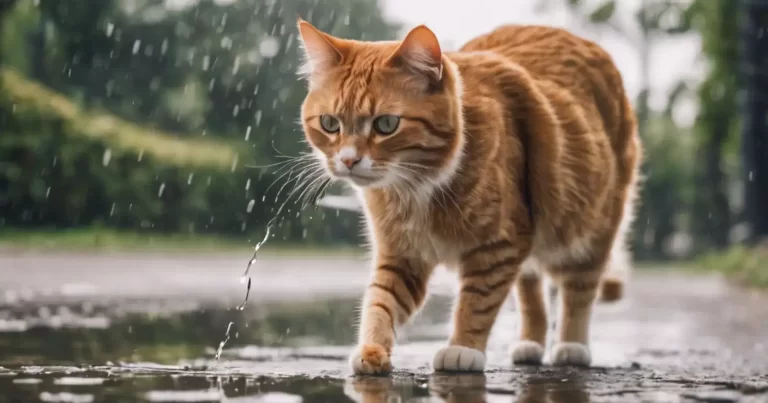Do Cats Like Eggs? Find Out the Answer Once and For All
Do cats like eggs? I know that my cat loves eggs. She will meow her lungs out if you try to exclude her when dining.
Now, I recently participated in a debate where some fur parents claimed that feeding your cats eggs is actually wrong!
As expected, I went into panic mode knowing too well my baby has been feasting on some. I did some research and here are my findings.
This article will benefit anyone who’s in doubt about whether or not your cat should be eating eggs.
Can cats eat eggs?
Cats can eat all sorts of eggs, from chicken eggs to quail eggs, and they offer a variety of health benefits. So if you’re wondering whether or not you should feed your cat eggs, the answer is a resounding yes!
1. Can cats eat raw eggs?
Cats should not eat raw eggs. This is mostly because the raw ones may contain salmonella bacteria that is harmful to our furry besties.
Feeding your cat raw eggs not only exposes your feline to Salmonella but also to Avidin. Avidin is a glycoprotein that prevents the proper absorption of biotin. This protein is highly involved in metabolic processes and is very important to our furry friends.
2. Can cats eat egg yolk?
Egg yolks are safe for cats and pose no major harm to cats. It is the main part of the egg and contains lots of protein. This is a big plus for cats considering they are carnivores and need protein to survive.
However, considering the egg yolk is the most nutrient-dense part of an egg, it should be taken in moderation. This is because they are high in fat, cholesterol, and calories.
If you’re not careful, you could be exposing your furry friend to obesity.

3. Can cats eat egg whites?
Cats can safely eat egg whites. However, they may not be as nutritious for your cat as other foods. Egg whites are mostly protein and fat, with very few carbohydrates. Cats need a balance of all three nutrients in their diet to stay healthy.
If you’d like to supplement your cat’s protein intake, one tablespoon in addition to their normal diet is enough.
4. Can cats eat whole eggs?
Whole eggs are the most nutritious option for cats. They contain a balance of protein, fat, carbohydrates, vitamins, and minerals that your cat needs to stay healthy.
5. Can cats eat scrambled eggs?
Yes, cats can eat scrambled eggs. However, you have to make sure the meal is not laced with salt or seasoning as these can affect your pet’s health.
Additionally, scrambled eggs come with additional calories from the frying. Be careful not to expose your furry bestie to obesity.
6. Can cats eat boiled eggs?

Boiled eggs are a great option if you want to feed your cat some eggs. During boiling, no additional fat is required, maintaining the calories in check.
If you’re watching your cat’s weight, then you can opt to remove the egg yolk since it highly dense in proteins and calories.
7. Can cats eat eggshells?
Are eggshells something your cat can feed on? Absolutely! They are an excellent source of calcium and phosphorous that help with bone formation and maintenance.
Wondering how to prepare and feed eggshells to your cat? Check out this cool article that explains the pros, cons, and everything you need to know about cats and eggshells.
Do cats like eggs?
Cats typically don’t like eggs. The smell is often too strong for them, and they can find the texture off-putting. However, some cats may be curious about eggs and want to give them a try.
As for my lovely Chacha, she’ll jump at any chance she’ll get to eat some eggs. It all boils down to the feline’s personal preference.
If you’re considering feeding your cat eggs, it’s best to consult with a veterinarian first to make sure it’s safe for them.

What is the nutritional value of eggs for cats?
Protein:
Eggs are a good source of protein for cats. One large egg contains about 6 grams of protein. Protein is essential for cats for muscle development, repair, and maintenance.
Fat:
Eggs also contain fat, which is a necessary part of the feline diet. Fat provides energy and helps the absorption of certain vitamins. One large egg contains about 5 grams of fat.
Vitamins and minerals:
Eggs are also a good source of vitamins and minerals, including vitamins A, and B, iron, and phosphorus.
| Nutritional value | % of daily calories needs | Importance |
| Proteins | 43.49% | – Muscle development – Muscle repair – Growth |
| Fat | 30.34% | – Provides energy |
| Calcium | 0.17% | – Bone development |
| Magnesium | 0.04% | – Helps in proper hormone secretion. – Helps deal with constipation and urinary disorders. |
| Phosphorus | 0.65% | – Bonds with calcium to help in bone formation. |
| Potassium | 0.46% | – Lowers blood pressure by neutralizing the effects of salt and helping cats to excrete excess sodium through urine |
| Sodium | 0.45% | – Ensures proper muscle cell and nerve functions. |
| Choline | 1.17% | – Helps with the proper functioning of the heart and blood vessels |
Are there any risks associated with feeding eggs to cats?
The primary risk associated with feeding eggs to cats is the potential for Salmonella infection. Cats can contract Salmonella from contaminated eggs, just like people can.
The bacteria can cause an unpleasant illness in cats. The symptoms include fever, diarrhea, and vomiting. In severe cases, Salmonella infection can even be fatal.
To minimize the risk of Salmonella infection, it’s important to only feed your cat fresh, clean eggs that have been properly cooked.
Avoid feeding your cat raw eggs or undercooked eggs, as these are more likely to be contaminated with bacteria. If you’re unsure about whether an egg is safe for your cat to eat, err on the side of caution and don’t feed it to them.
In addition to the risk of Salmonella infection, there are a few other potential risks to consider before feeding your cat eggs. For example, raw egg whites may inhibit the absorption of biotin (a B vitamin), which could lead to nutritional deficiencies over time if fed in large quantities.
Additionally, raw egg yolks contain a compound called avidin that binds biotin and prevents its absorption; cooking destroys avidin so this isn’t a concern if you’re feeding cooked eggs to your cat.
It’s also worth noting that feeding your cat too many eggs could lead to weight gain and other health problems, so it’s important to feed them in moderation.
Here’s what happens when cats eat eggs
Your cat’s muscles will get stronger from the high protein in eggs. Additionally, their coat may also shine and appear healthy. This will be because of the essential fatty acids found in eggs.
In addition, eggs contain many vitamins and minerals including vitamin A, vitamin D, iron, and selenium which will generally boost your cat’s health.
What’s the best way to give your cat eggs?
How to cook eggs for cats
The best way to give your cat eggs is by hard boiling them. This will ensure that they are cooked all the way through and safe for your cat to eat.
You can then either chop them up into small pieces or mash them before giving them to your cat.
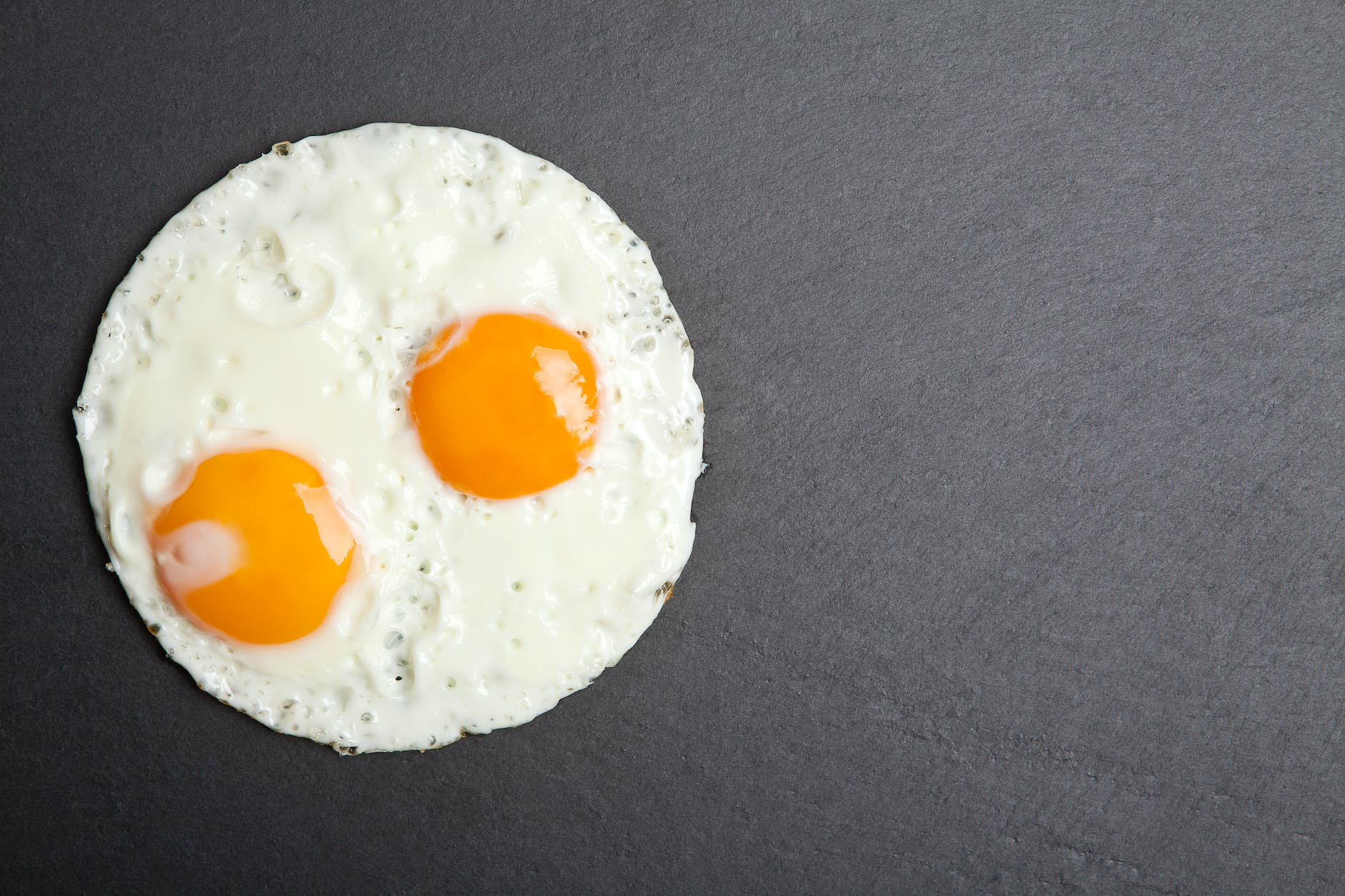
What type of eggs to give your cat?
The best type of eggs to give your cat are chicken eggs. They are a good source of protein and other nutrients that cats need.
You can also give your cat quail eggs, but they are more expensive and not as widely available.
How often to give your cat eggs?
You can give your cat eggs as often as you like, but it’s generally best to limit it to once or twice a week. Too much egg can lead to digestive problems for cats, so it’s important not to overdo it.
How much egg can a cat eat?
Cats can eat eggs, but too much egg can cause them to become sick. Symptoms of egg poisoning in cats include vomiting, diarrhea, and weakness. If your cat has eaten too many eggs, call your veterinarian immediately.
FAQ
Can kittens eat eggs?
Yes, kittens can eat eggs. But should they? Well, a kitten’s stomach is sensitive compared to an adult’s cat. For this reason, it is best to stick with recommended kitten food.
Do cats need to eat eggs?
Cats don’t need to eat eggs, but they can be a healthy addition to their diet. Eggs are a great source of protein for cats. They’re also relatively easy to digest and can help with various health problems.
However, if your cat has health problems or is on a special diet, you should check with your vet before giving them eggs.
What can I do if my cat accidentally eats raw eggs?
If your cat has eaten raw eggs, watch for signs of illness such as vomiting, diarrhea, or lethargy. If your cat shows any of these symptoms, take them to the vet immediately.
The treatment will depend on the severity and may include IV fluids, antibiotics, and/or other supportive care.
To prevent your cat from accidentally eating raw eggs, make sure to keep them out of reach and properly stored. You can also feed your cat cooked eggs instead of raw ones.
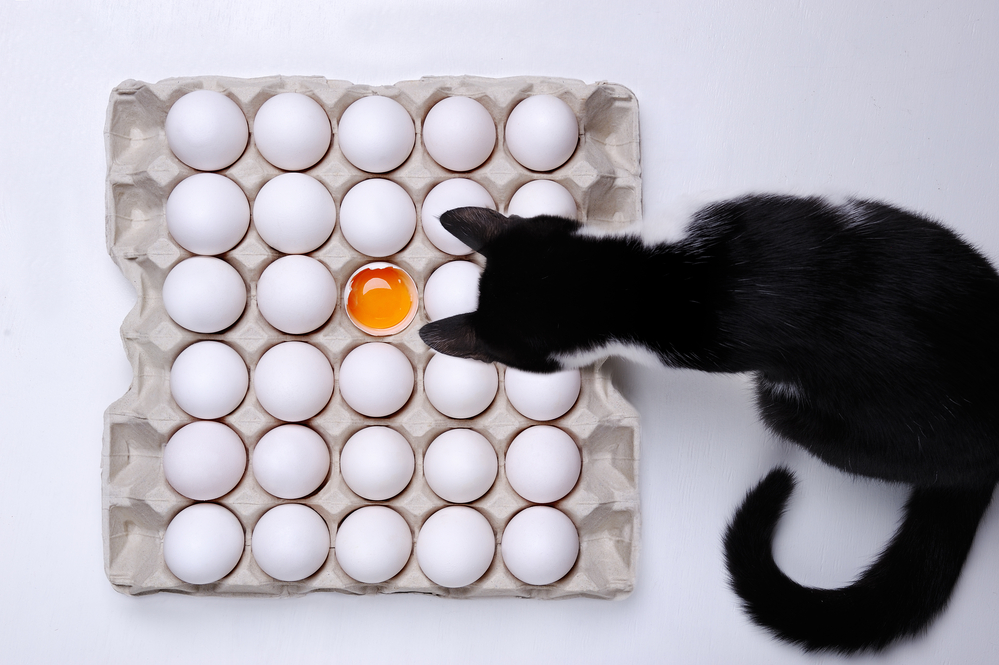
Can cats be allergic to eggs?
Just like humans, cats also have allergies. Some cats can be allergic to eggs. This is most likely due to an allergy to the protein in eggs.
Can you feed a cat cooked eggs?
You can feed your cat cooked eggs as a treat. Just make sure they are fully cooked and not raw.
Can cats eat eggs and cheese?
Yes, cats can eat eggs and cheese. However, cheese is high in fat and calories, so it should be given in moderation. Cats with lactose intolerance may not be able to digest cheese properly and may experience stomach upset or diarrhea if they eat too much of it.
Can I feed my cat too much egg?
Feeding your cat too much egg is dangerous to their health and should be avoided. This protein food is highly packed with calories and cholesterol.
So, overfeeding your cat with eggs can make them become obese.
Can cats eat quail eggs?
Absolutely! Quail eggs are a good source of protein, vitamins, and minerals. They also contain all eight essential amino acids. However, they are relatively high in cholesterol compared to other types of eggs.
As long as your cat is not allergic to quail eggs and you don’t overfeed them, there’s no reason why they couldn’t enjoy the occasional egg as a treat. Just be sure to cook the egg thoroughly to reduce the risk of salmonella poisoning.
